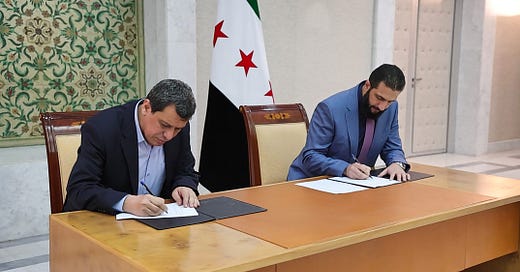Sharaa and SDF's Abdi Reach Landmark Agreement, But Key Kurdish Demands Left Unaddressed
Major challenges will likely persist and emerge during the implementation of the March 10 agreement.
(Image credit: Syrian Arab Republic Presidency’s X account)
Note: This article will be updated as new information becomes available.
What’s happening:
In a major development, Syria’s interim president Ahmed al-Sharaa and Syrian Democratic Forces (SDF) General Commander Mazloum Abdi signed an eight-point agreement in Damascus on March 10. The agreement was announced on the official Syrian presidency’s account on X.
Significance:
The agreement lays the groundwork for resolving tensions between Damascus and the SDF-led Kurdish administration in northeast Syria. Three points in particular—guaranteeing citizenship for Kurds, the return of displaced Kurds, and the nationwide ceasefire—are especially important for the Kurdish community. However, implementing the agreement will be challenging. The details of the SDF’s nearly 100,000-strong force (which consists mostly of Arabs) and the administration of territories under the SDF-affiliated autonomous administration remain unclear.
Coming on the heels of sectarian violence in coastal Syria and widespread criticism of Sharaa and his affiliated forces, the agreement could be an attempt by Sharaa to boost his legitimacy among Syrians and project an image of a statesman capable of addressing Syria’s challenges, including the grievances of minority communities.
Key details and insights:
The agreement’s key provisions include:
Inclusive Political Participation: Ensures the right of all Syrians to engage in the political process and state institutions.
Recognition of Kurdish Rights: Acknowledges Kurds as an "authentic community" in Syria and guarantees their citizenship and constitutional rights—an essential step in addressing the long-standing statelessness of hundreds of thousands of Kurds since 1962. This move could serve as a goodwill gesture from Sharaa or any future post-interim government toward Syria’s Kurdish population.
Ceasefire: Calls for a ceasefire across all Syrian territories. This provision is particularly significant for the SDF and Kurds, who continue to face attacks by the Turkey-backed Syrian National Army (SNA). The SNA, though nominally part of Sharaa’s government forces, has been increasingly unruly, as evidenced by its alleged role in the recent violence against Alawite civilians in coastal areas.
Integration of the SDF: Calls for incorporating all SDF military units and affiliated civilian institutions into the Syrian state’s administration, including border crossings, airports, and oil and gas fields.
Return of Displaced Kurds: Guarantees the right of all displaced Kurds to return to their homes.
Fighting Assad Regime’s Remnants: Pledges support for the Syrian state in its struggle against the remnants of the Assad regime and all threats to its security and unity.
Commitment to Unity: Rejects partition, division, and hate speech in Syria.
Implementation Timeline: Bilateral committees will oversee the agreement’s provisions, aiming for full implementation by the end of 2025.
No talk of decentralization
While the agreement marks a step toward Kurdish recognition and potential stability, it does not include any mention of decentralization for SDF-controlled areas—a major omission given the SDF's long-standing calls for self-administration in northeast Syria.
Also, a key unresolved question is whether SDF forces will maintain some level of autonomous command, somewhat similar to the Peshmerga forces in neighboring Iraqi Kurdistan, or if they will be fully integrated into the Syrian military under Sharaa’s command. The agreement also does not address linguistic and cultural rights for Kurds—a long-standing Kurdish grievance. Kurdish has been legally banned for much of Syria’s post-1946 history, though its use has been tolerated to varying degrees over the years. Under Kurdish self-rule, Kurds in northeast Syria have enjoyed full linguistic and cultural rights for the past 13 years.
A draft constitution for northeast Syria prepared by SDF-affiliated groups in late 2023 called for self-administration for the region and the recognition of Kurdish, alongside Arabic and Assyrian, as official languages. The current agreement, however, omits such provisions.
Connection to Turkey-PKK peace talks?
The abrupt announcement of the agreement surprised many Syria analysts. However, Eye on Kurdistan sources indicate that Sharaa and Abdi had an unpublicized meeting in December, mediated by the U.S., and that negotiations have been ongoing for several months.
The timing of the agreement raises questions about its potential connection to ongoing peace efforts between Turkey and the Kurdistan Workers’ Party (PKK). On February 27, PKK leader Abdullah Öcalan called for the disarmament and dissolution of the PKK and its affiliated groups. Since the SDF’s core group, the People’s Protection Units (YPG), and its political wing, the Democratic Union Party (PYD), operate under the umbrella of the Kurdistan Communities Union (KCK)—of which the PKK is the main component—the Sharaa-Abdi deal may have been influenced by these broader regional dynamics.
Notably, the agreement does not call for decentralization, a concept Öcalan explicitly dismissed in his historic peace announcement for Turkey.
U.S. role and the fate of ISIS detainees
The agreement came one day after U.S. Secretary of State Marco Rubio issued a strong statement condemning sectarian violence in Syria’s Alawite-majority coastal areas. He called for protecting "Christian, Druze, Alawite, and Kurdish communities" and labeled pro-Sharaa forces as "radical Islamist terrorists" and "foreign jihadis." However, the statement also urged the interim government to “hold the perpetrators of these massacres against Syria’s minority communities accountable.”
Given the timing, it is unlikely that the March 10 agreement occurred without U.S. knowledge or approval. This suggests Washington may be signaling its support for stabilizing Sharaa’s government.
A crucial aspect missing from the agreement is the fate of the Islamic State (ISIS) detainees and their families in SDF-controlled prison and camp facilities. Although the issue was not explicitly addressed, it was likely discussed in negotiations. Its omission could indicate that the U.S. is not yet prepared to fully entrust Sharaa’s forces with securing these facilities, given the presence of unruly elements within his military ranks.



